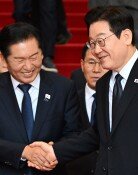Pyongyang should agree on joint investigation rather than reacting unreasonably
Pyongyang should agree on joint investigation rather than reacting unreasonably
Posted September. 28, 2020 08:02,
Updated September. 28, 2020 08:02
The Korean Central News Agency (KCNA) of North Korea claimed on Sunday in an article titled “We issue warning to Seoul” that South Korea has invaded the waters of by dispatching a large number of ships and vessels. It called upon the South to cease the search missions on the southern side of the Northern Limit Line (NLL), which aim to discover a body of a South Korean civilian shot to death by North Korean troops, while criticizing it as violation of territorial waters. “It only arouses wariness and invites further trouble for Seoul,” according to the North Korea's official news agency.
Just two days after Seoul called for an in-depth investigation into the incident while proposing to initiate a joint investigation, Pyongyang published the article that seemingly intended to turn down the proposal. Also, the intention of issuing a report on the state-run newspaper, which is seen as a low level of warning, is to find out how Seoul reacts. What’s worse, Pyongyang used a worn-out tactic to nullify the NLL – an argument to deny the de facto maritime border line. Its message may imply that it was in a hazardous conflict zone that the incident happened, delivering a firm rejection of both an extra search and a joint investigation.
At the same time, North Korea used a cliché trick to tacitly talk of an independent search plan and steps to hand over a missing body. Such a deceptive attitude was obviously demonstrated in a telephone message sent by the North on Friday. Although Pyongyang admitted that it shot a South Korean civilian, it denied all the developments that unfolded after the killing – including acts of appalling atrocity. It said that the South Korean civilian did not show any intention to defect to the North, arguing that it did not burn the body but the object that he was floating on.
The only way to reveal the truth behind the horrible death of the South Korean fishery officer is to discover the missing body. Let's say that North Korea does not lie about how it treated the body and that North Korean leader Kim Jong Un apologized with some degree of sincerity. Then, there may be no reason for Pyongyang to hesitate to embark on a joint search and investigation. Furthermore, it may be reasonable that Pyongyang is ready and willing to make access to the northern side of the NLL temporarily available.
Surely, it may not be an easy decision to make to say yes to an unprecedented joint investigation. This only makes it all the more necessary for the South Korean government and the ruling party to help build a public consensus to press for a joint investigation. National security authorities should have held the North accountable for the incident rather than describing its swift apology as an unprecedented reaction. Regrettably, the ruling party and its supporters illustrate the North Korean leader as an enlightened ruler while going the extra mile to minimize the effect of the incident on inter-Korean relations. Given all of this, it is no wonder that Pyongyang has not yet grown out of the bad habits of running amok with insane threats and a nonsensically unreasonable response.







